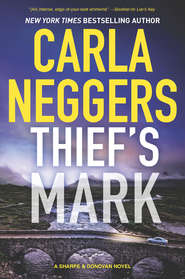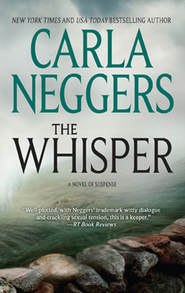По всем вопросам обращайтесь на: info@litportal.ru
(©) 2003-2024.
✖
Betrayals
Автор
Год написания книги
2018
Настройки чтения
Размер шрифта
Высота строк
Поля
Jared heard Mai’s sharp intake of breath and saw the look of amusement her obvious fear and hurt elicited from the biker.
He snapped.
Putting all his weight on the door of the limousine, he lunged toward the big motorcycle. The force of the door hitting the bike’s front tire caught the driver off guard and wrenched the handlebars out of his hands. He couldn’t clear the bike and went down with it, catching his left leg underneath it. Jared didn’t lose any time. He leaped over the fallen motorcycle and jumped on the bastard who’d insulted his daughter.
It wasn’t the other bikers coming to the aid of their trapped buddy or the police jumping into the fray that stopped Jared from beating the guy senseless.
It was Mai.
“Daddy!” she cried.
He released the man’s flabby throat and climbed back over the motorcycle, putting out his arms as Mai ran to him, near tears. He told her softly, “It’s okay. They’re just punks.”
Reluctant to prolong the confrontation, the police let the bikers shove off. Jared noticed he’d gotten grease on his tuxedo and his tie had come undone. So much for sartorial splendor.
He put out his arm for Mai. “Madame?”
She giggled and laid her small hand on his crooked elbow. “I should have helped you beat that guy up.”
“One hothead in the family’s enough.”
The photographer continued to click away, but Jared ignored him and the cheering onlookers as he escorted his daughter to her first charity ball.
Four
Almost a week after Winston & Reed had ousted her, Rebecca found herself painting her nails red and scanning a magazine article on Phoenix. She’d never lived in Phoenix. She wasn’t sure it’d be smart to move there at the beginning of summer, but desert living had an exotically romantic appeal. And there wasn’t much to keep her in Boston. Her fledgling one-woman studio was at a lull.
Of course, painting her nails and reading magazines weren’t going to help that. She wasn’t above scrambling for work. She’d worked in enough studios to appreciate the demands of the graphic design business and knew what it took to succeed. Talent alone wasn’t enough—it also took sheer grit. When she’d first returned to Boston, she’d worked hard. Not wanting to hire anyone until she’d made the commitment to stay, she did everything herself. She was her own account executive, senior designer, office manager, receptionist and gofer.
Her studio occupied several airy rooms in a crummy building a few blocks in the wrong direction from the Boston Children’s Museum. She’d bought the building back before real estate prices in metropolitan Boston had skyrocketed. It was on the site of the original warehouse owned by Blackburn Shipping way back in 1800. Her fellow tenants—none of whom knew she was their landlady—included a grumpy printer she’d never hire to do any of her work, an office supply wholesaler, a caterer, three or four accountants and about a dozen other strange little businesses that didn’t need to rely on walk-in customers.
The telephone roused Rebecca from consideration of becoming the art director for a Scottsdale-based international resort chain. How posh. She could hit the Jacuzzi on her lunch hour and get free vacations.
She flipped on her background-noise tape and picked up the phone. “Rebecca Blackburn.”
“R.J.—what’s that noise in the background?”
Rebecca grinned at Sofi Mencini’s voice. “My office staff busily at work. I read somewhere background noise encourages callers to take a one-woman outfit more seriously—makes them think I’m actually running a business here.”
“Turn it off. I’ve got news.”
Sofi wasn’t one to fool around between nine and five; it was just now ten-thirty. The honey-haired, diminutive cocreator of Junk Mind was Rebecca’s best friend and former roommate, a woman of wit, endurance and determination. Years ago Sofi had arrived at Boston University as the sheltered upper-middle-class girl from the suburbs, while Rebecca had been the outcast Boston Brahmin come home after ten years of exile in central Florida with her mother and five younger brothers. They’d both made their bids for independence—Sofi through one measured, deliberate act of will after another, Rebecca explosively. While Junk Mind was going on, Sofi had gotten her MBA and was ready when opportunity knocked to jump into corporate America. She’d never looked back.
“You’ve made the tabloids,” Sofi said in her no-nonsense manner.
Rebecca laughed. “What, someone found out Winston & Reed axed a Blackburn?”
She grimaced at the unexpected bitterness in her tone. Until Boston, she had never taken a position without believing absolutely that this one would be the right one—that at last she’d found her niche, her home. She always worked her hardest. In terms of design, she invariably performed beyond her employer’s already high expectations. While being fired or quitting did have its liberating side, it also provoked a more difficult emotion, an indescribable emptiness and sense of betrayal, a feeling of loss. But her bid for the Winston & Reed job—even, to a degree, coming back to Boston—wasn’t an attempt just to get work or establish some sense of stability in her life.
What she was doing, she knew, was tempting fate.
“Yeah, I heard about that,” Sofi said. “At least you won’t starve without Quentin Reed’s money.”
“I’m thinking about moving to Arizona and taking up painting cacti. In a pinch I could sell a few off the tailgate of my truck to tourists.”
“R.J., you make me crazy.”
“On the other hand, I’m a designer, not a painter. I wouldn’t be any good at cacti paintings.”
“You don’t need to paint cacti or anything else so quit this poor artist routine.”
Sofi was always ready to poke fun at her friend’s money habits. “So what’s this about the tabloids?” Rebecca asked, steering Sofi back onto the subject.
“R.J., The Score’s got your picture on the front page—and that you’re currently operating a graphic design studio on the Boston waterfront. A reporter weaseled it out of one of the underlings here.”
Rebecca put down the brush to her red nail polish. Sofi’s news, at any rate, explained the messages she’d ignored from a reporter wanting to interview her; he’d never said what newspaper he represented. She didn’t blame him. Not that it would have mattered: she’d quit talking to reporters a long time ago.
“I haven’t gone near a reporter or a photographer in years,” she said.
“I know.”
“Sofi?”
“Think back, R.J. The fall of Saigon. Tam, Mai…”
Rebecca shut her eyes.
Jared.
“Oh, no.”
Quentin Reed hesitated before pushing open the wrought-iron gate that marked the entrance to the Winston house on Mt. Vernon Street. One of the few free-standing houses on Beacon Hill, it was a quintessential Charles Bulfinch design with its pristine Federal lines, brick facade, black shutters and doors. Two huge old elms, coddled against the ravages of Dutch elm disease, shaded the brick sidewalk and front lawn, also a rarity on the Hill. Quentin had walked from Winston & Reed. Any meeting with his mother unsettled him; one called suddenly, with a request that he come at once, made him drag his heels, not so much to postpone the inevitable but to steel himself for it. He stood a moment in the shade, taking in the quiet of Beacon Hill. He could hear birds twittering in trees and shrubs; the crush of Beacon Street and the Common, of downtown Boston only blocks away, seemed distant.
Inhaling deeply, he smelled mowed grass and flowers, not just exhaust fumes, and finally he headed up the brick walk and over to the cobblestone carriageway. His wealthy mother’s cavalier attitude toward security was notorious among her friends, but she refused to change. She had always loved risks and adventure, and hated the idea of living like a paranoid old woman. She considered her inside alarm system, the lock on her carriageway gate, and Nguyen Kim, her full-time bodyguard and driver, sufficient protection.
As he walked around to the rear of the big house, Quentin could feel the critical eyes of generations of Winstons on him. The ghosts, he called them. They’d always been a proud, principled, damnably lucky lot. They’d made their first fortune in the pre-revolution China trade, another in the post-revolution China trade, after they’d returned from the safety of Canada and silenced their critics by pumping money back into Boston’s war-decimated economy. They were there when the Industrial Revolution had arrived and profited from a burgeoning textile industry, and like so many rich merchants and manufacturers in New England, they learned the ins and outs of conservative money management to preserve their fortune. When he married Annette Winston, Benjamin Reed was to apply those principles to her considerable assets. Instead he founded Winston & Reed.
Quentin could still see his father, a Connecticut Yankee never comfortable on Beacon Hill, standing atop Pinckney Street just after a snowstorm, with his bare head in the gusting February wind as he watched his only child careen down the steep hill on his sled. “Keep going!” Benjamin Reed had yelled. “You’ll make the river yet!” He seemed oblivious to the impediments between Quentin’s speeding sled and the Charles River: busy Charles Street, Storrow Drive, the median, fences, the Esplanade. Quentin would always stop at the corner of West Cedar Street, as his mother had instructed him to before he left the house, and wonder if he’d somehow failed his father for not even trying to make the river’s edge. But that was the man Annette Winston had married: filled with grand ideas, but without the drive or the strategic abilities to carry them out.
In 1966, three years after his father’s death, Quentin had left Beacon Hill for good. There was boarding school, then Harvard, Saigon, then a condominium on Commonwealth Avenue and a position at Winston & Reed. He’d since taken a huge apartment in the Winston & Reed–built five-star hotel on the Public Garden, but he’d surprised everyone when he’d opted for a view of Park Square over the more coveted—and expensive—view of the Garden and Beacon Hill. He and his wife, Jane, also owned a house in Marblehead on the North Shore, which Quentin adored. Jane was living there alone for the moment while they worked out problems in their marriage, but he hoped when they were back together they could abandon the city altogether, an idea he wisely kept from his mother. She expected him to return to Mt. Vernon Street. The house was his to inherit.
“Lucky me,” he muttered, wishing his mother would will the damned place to someone else. But to whom? He and Jane had no children as yet. Quentin hoped a family was in their future, but right now he couldn’t be certain his marriage was going to survive. There was Jared, but his cousin hadn’t shown up in Boston since 1975 and wasn’t particularly fond of his Aunt Annette. And Jared’s daughter Mai was out. She wasn’t a part of Boston, of her great-aunt’s view of the Winstons. As usual, Quentin was stuck.
He found his mother in her stone garden house, transplanting pink geraniums into scrubbed terra-cotta pots. Gardening, he felt, was one of those chores Annette Winston Reed pretended to enjoy but secretly loathed. At sixty, she had chosen to play the game of representing the honor, dignity and charm of a bygone era—of being the proper Boston Brahmin dowager. She looked the part well enough with her gracefully graying hair, her reserved style of dress, her unconventional beauty. With age, she’d come into her particular kind of attractiveness; her strong features and height made her seem elegant without being frail. She sat on the boards of numerous nonprofit organizations and was generous with her time, energy and intelligence. People saw her as a well-bred, if formidable, Beacon Hill lady.
Yet there was another side to Annette Reed: the side that had made her the successful, imposing chairman of Winston & Reed, the woman who had led the company since her husband’s death. It was she who had transformed it into a major player in the volatile and lucrative real estate and construction markets of the northeast United States. However, she seemed ambivalent about her power and her business triumphs. Oddly true to her own background and era, in public she credited her husband for his conception of the company and her son for running it. In private, however, she made sure Quentin knew who was in control. Yet, at the same time, she didn’t hide her frustration with him for acquiescing to her will, seeing it not as respect for her abilities but as a sign of weakness in him. Not that she’d have tolerated anything else. Quentin had come to see that his mother’s need to control stemmed not from strength and intelligence, as he had once believed, but from insecurity and selfishness. As for himself, he was damned if he did and damned if he didn’t.
“Quentin—dear, it’s so good to see you.” She pulled off her gardening gloves. “Kim just put out lemonade in the garden. Shall we?”











